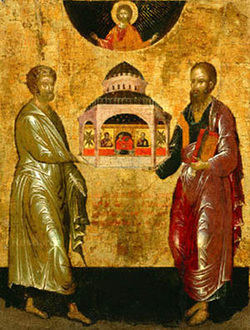
St. Thomas Aquinas: “Whether a man is bound to correct his prelate”
"…It must be observed, however, that if the Faith were endangered, a subject ought to rebuke his prelate even publicly. Hence Paul, who was Peter’s subject, rebuked him in public, on account of the imminent danger of scandal concerning faith …" [Peter had scandalized potential converts and threatened the mission of the Church by appearing to follow Mosaic dietary laws and refusing to eat with Gentiles.] St. Thomas here observes that the public rebuke of a prelate "would seem to savor of presumptuous pride; but there is no presumption in thinking oneself better in some respect, because, in this life, no man is without some fault. We must also remember that when a man reproves his prelate charitably, it does not follow that he thinks himself any better, but merely that he offers his help to one who, ‘being in the higher position among you, is therefore in greater danger,’ as Augustine observes in his Rule quoted above." Summa Theologica, Q. 33, Art. V, Pt. II-II.
St. Robert Bellarmine: "Just as it is licit to resist the Pontiff that aggresses the body, it is also licit to resist the one who aggresses souls or who disturbs civil order, or, above all, who attempts to destroy the Church. I say that it is licit to resist him by not doing what he orders and by preventing his will from being executed; it is not licit, however, to judge, punish or depose him, since these acts are proper to a superior.” St. Robert Bellarmine, De Romano Pontifice, Book II, Chapter 29.
Francisco Suarez: "And in this second way the Pope could be schismatic, if he were unwilling to be in normal union with the whole body of the Church, as would occur if he attempted to excommunicate the whole Church, or, as both Cajetan and Torquemada observe, if he wished to overturn the rites of the Church based on Apostolic Tradition … If [the Pope] ... gives an order contrary to right customs, he should not be obeyed; if he attempts to do something manifestly opposed to justice and the common good, it will be lawful to resist him ..." De Fide, Disp. X, Sec. VI, N. 16.
Pope Paul IV: "the Roman Pontiff, who is the representative upon earth of our God and Lord Jesus Christ, who holds the fulness of power over peoples and kingdoms, who may judge all and be judged by none in this world, may nonetheless be contradicted if he be found to have deviated from the Faith." Bull Cum Ex Apostolatus Officio (1559).
[1] For a good explanation of what a "conservative" is in the Church today please read this article: http://www.seattlecatholic.com/article_20011221_A_Brief_Defense_of_Traditionalism.html. Also see Attila Guimarães' description of a "conservative": http://www.traditioninaction.org/Questions/D001interview_Eastern.htm#Q10. Other traditional Catholics refer to such "conservatives" as "neo-Catholics". For a fuller explanation of what a "neo-Catholic" is see: http://www.dailycatholic.org/issue/2002Oct/oct9tra.htm.
 RSS Feed
RSS Feed
